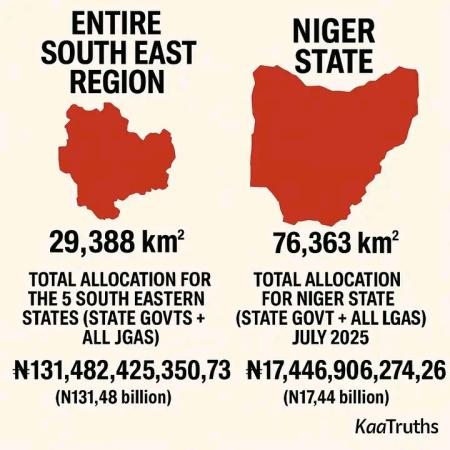| Welcome, Guest |
You have to register before you can post on our site.
|
| Online Users |
There are currently 74 online users.
» 0 Member(s) | 72 Guest(s)
Bing, Google
|
| Latest Threads |
How Farmers Lose Profit t...
Forum: Make Money Info
Last Post: Techie Farmer
1 hour ago
» Replies: 0
» Views: 6
|
Trading: The Fastest Way ...
Forum: Make Money Info
Last Post: CassavaBoss
11 hours ago
» Replies: 2
» Views: 133
|
Nigeria’s first nationwid...
Forum: Crops & Plantation Farming
Last Post: Henlus
11 hours ago
» Replies: 20
» Views: 670
|
Make Millions with Ginger...
Forum: Agro-Processing
Last Post: Ekene
Today, 09:37 AM
» Replies: 12
» Views: 209
|
Bread, Bromate and Dora A...
Forum: Health
Last Post: Suarus
02-15-2026, 09:51 PM
» Replies: 6
» Views: 314
|
Folate defficiency in Pre...
Forum: Health
Last Post: AgroInnovate
02-10-2026, 09:58 PM
» Replies: 8
» Views: 356
|
Why Dangote’s Move Matter...
Forum: General Discussion
Last Post: Agtech
02-10-2026, 02:25 PM
» Replies: 14
» Views: 484
|
Компания «Сантехторг»
Forum: Agric News
Last Post: efydovoc
02-10-2026, 04:54 AM
» Replies: 0
» Views: 79
|
See Why Receipt Papers ar...
Forum: Health
Last Post: Locus
02-07-2026, 09:27 PM
» Replies: 11
» Views: 355
|
SOYALAC AND DARAK: THE FO...
Forum: Health
Last Post: Kryon
02-06-2026, 02:04 PM
» Replies: 5
» Views: 278
|
The Hypocrisy of Innocent...
Forum: Religion
Last Post: Hunter
02-05-2026, 09:51 PM
» Replies: 6
» Views: 153
|
Mellstroy Game – официаль...
Forum: General Discussion
Last Post: ypojojevako
02-01-2026, 10:20 PM
» Replies: 0
» Views: 82
|
Peste des Petits Ruminant...
Forum: Livestock Farming
Last Post: Danny
01-31-2026, 09:20 PM
» Replies: 5
» Views: 233
|
The Danger of Acting on W...
Forum: Religion
Last Post: Henlus
01-26-2026, 09:33 PM
» Replies: 0
» Views: 123
|
Why you should Never Trim...
Forum: Health
Last Post: Henlus
01-26-2026, 09:23 PM
» Replies: 0
» Views: 134
|
ABEL DAMINA: The False Te...
Forum: Religion
Last Post: FarmLady
01-24-2026, 11:36 PM
» Replies: 9
» Views: 492
|
Kola Nut: How Nigeria Tur...
Forum: Agro-Processing
Last Post: FarmLady
01-24-2026, 10:55 PM
» Replies: 11
» Views: 510
|
2026: Don’t waste your mo...
Forum: Crops & Plantation Farming
Last Post: Locus
01-24-2026, 08:18 PM
» Replies: 8
» Views: 527
|
The Battery that lasts fo...
Forum: Renewable Energy
Last Post: Farmqueen
01-24-2026, 04:26 PM
» Replies: 11
» Views: 458
|
Self-defence: Sunday Jack...
Forum: Agric News
Last Post: Danny
01-23-2026, 11:17 PM
» Replies: 9
» Views: 453
|
|
|
| Before Blaming Abuja, Read This About South East Governors |
|
Posted by: Henlus - 12-02-2025, 07:08 AM - Forum: Off-Topic
- Replies (7)
|
 |
Let Me Show You What Will Shock You About Niger State and the Entire South East Region.
You know, sometimes, the truth hits harder when you reduce geopolitics into simple, undeniable numbers.

Let’s start with something most people don’t know:
SIZE COMPARISON
The entire South East region of Nigeria
(Abia, Anambra, Ebonyi, Enugu, Imo)
has a combined landmass of 29,388 km².
Niger State alone has a landmass of 76,363 km².
Read that again.
Niger State is 2.5 times bigger than the entire South East put together.
So naturally, you would assume Niger State should receive FAR more federal allocation than the South East, right?
Let’s look at the facts for July 2025. I picked July because that’s readily verifiable.
(All allocation figures below were extracted directly from the FAAC Disbursement Report for July 2025, published by the Office of the Accountant-General of the Federation (OAGF).)
FAAC ALLOCATION – JULY 2025
Total allocation for the 5 South Eastern states (state govts + all LGAs):
N131,482,425,350.73
(N131.48 billion)
Total allocation for Niger State (state govt + all LGAs):
N17,446,906,274.26
(N17.44 billion)
Now pause and think.
The South East, a region smaller than Niger State received N131.48 billion in one month.
Niger State, a single state, received N17.44 billion.
That means:
THE SOUTH EAST RECEIVED OVER 7 TIMES MORE MONEY THAN NIGER STATE IN THE SAME MONTH.
Yet, Niger State is 2.5 times bigger than the region.
Please, don’t get this twisted. The point is not who receives bigger allocation or who deserves a bigger allocation. The point is to show you how small in landmass the South East is and yet our governors have failed to develop it with all the money they receive through allocation and IGR.
The question is: WHY CAN’T THE SOUTH EAST GOVERNORS DEVELOP AND SECURE THE REGION?
Why can’t we secure our villages?
Why can’t we fix our roads?
Why are we crying of marginalization and at the same time watching governors burn billions with zero accountability?
Why is our region unsafe, underdeveloped and we are constantly blaming the president?
This is less than half of Niger State that’s governed by fiver governors.
The numbers don’t lie.
The South East is not lacking allocation.
The South East is not lacking resources.
The South East is lacking LEADERSHIP.
The question every Igbo person must now ask is simple:
What are South East governors doing with N131.48 billion in one month?
What are the senators doing?
What are the House of Reps members doing?
What are the LGA chairmen doing?
Don’t let anyone deceive you, our problem is NOT just the Federal Government.
Our problem is internal looting and internal irresponsibility.
The same Igbos shouting “marginalization” have never marched with the same anger to the gates of their governors’ lodges.
We shout at Abuja but remain silent in front of the real thieves in our backyard.
How can a region that earns seven times more than a state bigger than their entire landmass still remain insecure, scattered, neglected, and underdeveloped?
How?
In my own village, there’s no electricity. I don’t even want to talk about road and there are many mining sites where billions of Naira have been made.
My brothers and sisters, the truth is:
Before the South East blames Nigeria, we must first hold our OWN leaders accountable.
Because the day Ndi Igbo begin to demand transparency from their politicians…
The day we stop worshipping governors and start auditing them…
That day, the South East will rise again, stronger, richer, and more united than ever.
It is not Abuja that is holding us down.
It is our own leaders feeding fat every month while the land bleeds.
Let this sink in.
-KAA (facebook.com)
Host of KaaTruths Podcast.
|

|
|
| THE FIRST SHALL BE LAST AND THE LAST SHALL BE FIRST |
|
Posted by: Henlus - 11-29-2025, 10:22 PM - Forum: Religion
- Replies (5)
|
 |
In Matthew chapter 19 verse 30 Jesus spoke a powerful truth. He said that many who are first will be last and many who are last will be first.
This statement came immediately after the story of the rich young ruler. This rich man came to Jesus. He had money. He had influence. He had kept the commandments from his youth. In the eyes of society he was already first. But when Jesus told him to give up what controlled his heart and follow Him the man walked away in sorrow. He loved his wealth more than he loved God.
Right after this Peter said to Jesus We have left everything to follow You. What shall we have?
Jesus responded by promising the disciples a great reward. They looked like the least in the eyes of people. They were fishermen. They had no titles or riches. But they gave up what the rich man refused to surrender. Then Jesus warned them not to become proud. He said that many who look first now will become last in the kingdom of God and many who appear last now will become first.
The message is simple.
Human beings celebrate wealth and status. Heaven celebrates humility and obedience.
The rich man looked like a champion but he ended up losing everything of eternal value. The disciples looked ordinary but God lifted them.
Today you may feel unseen or unimportant. Maybe people overlook you or despise you. Remember this. Heaven does not judge by outward position. Heaven judges by the heart.
Keep serving God. Keep walking in humility. Keep choosing obedience even when it costs you.
When God rearranges the line those who seemed last will stand in front and those who boasted in their own power will find themselves behind.
In the end the only position that matters is where you stand with God.
|

|
|
| Terrorism Rose After Kyari Fell: Coincidence or Design? |
|
Posted by: Henlus - 11-28-2025, 01:52 PM - Forum: Off-Topic
- Replies (12)
|
 |
Insecurity! Insecurity!
You all will soon know why they kept ABBA KYARI in prison deliberately till now.

The man told me things with evidence that brought tears to my eyes in prison.
I wanted to speak for him, but some ignorant Nigerians felt i was released from prison to push Abba Kyari's agenda.
It is way deeper than what you guys know or see.

If Kuje is holding 950 inmates, Abba Kyari and his IRT men are responsible for at least 450 of those inmates. Majority are evil bandits, dangerous kidnappers, hardline ISWAP & Boko Haram terrorists, & deadly armed robbers.
This is not what someone told me, i saw them in Kuje, i even interviewed some of them including the people who kidnapped late president Buhari's cousin. Abba Kyari arrested all.
They deliberately took out Kyari from the system with frivolous allegations because he was a stumbling block to the rising terrorism and insecurity in Nigeria and was blocking them from achieving their big agenda, especially with banditry.

As a Borno man himself they warned him and wanted him out the way but he refused. Today he is languishing in prison, and insecurity is flourishing in Nigeria.
When they took out Abba Kyari and sent him to Kuje prison in March 2022, they planted their people to kill him in prison so they can close his chapter.
But Kyari was taken to a very protected private V.I.P cell in Kuje that holds only 3 inmates. It has 3 gates, and each of the inmates are alloted one cell with toilet and bathroom in it.
when former governor of Kogi State Yahaya Bello was taken to Kuje prison, he stayed in one of those cells. If not so, someone could harm or kill him in prison. It's that same private cell they Kept that American from Binance who was arrested in Nigeria. Tigran Gambaryan.
So when they couldn't succeed in killing Kyari immediately in Kuje, Boko Haram mysteriously attacked Kuje prison after just four months of his stay in July 2022. They broke all the prison cells open, except the protected cell where KYARI was held. They did everything to break into that cell to kill Kyari, but it was a well protected cell with three entrance gates before seeing Kyari. They broke the first gate, shot sporadically for over 30 minutes to gain entrance into the second gate.
They fired the high walls of his prison cell, but it was too strong so couldn't penetrate.
Because time was fast running out of them, they had to run with their already rescued members. They freed some hardline terrorists, robbers, kidnappers, bandits,
They told Kyari that he must die, that he will never escape death.
Fellow Nigerians, can we all ask the government to open and re-investigate KYARI's case again afresh. If you know the details behind his case and if you see evidence, your jaw will drop.
A man who arrested drug dealers, acting on a classified information.
The dealers confessed and indicted top officers of the ***"" who are supposed to arrest drugs dealers by law. The dealers even showed evidence on how they smuggle drugs into Nigeria with advanced clearance from those top officers of the **"" after good payment and settlements by their top barons.
Kyari took those dealers to **** and requested that those indicted officers be handed over to him for questioning. Because bigger fishes will fall if Kyari opens investigation into the smuggling case, there was a well planned set up. They did it so well so it can be captured on camera for them to spin the narrative against him. The people who did it, called for a meeting on how to settle the informants who gave out the classified information to his team, but ended up setting camera to spin the narrative. He trusted them because he had worked with them before, but they set him up when the ship was down.
Today those Drug dealers he arrested with hard drugs are now free, they are even standing as witnesses against him in his ongoing trial. Guess who is prosecuting him in court? *** 😭
There are three sides to a story, if we must know the truth.
- From Facebook
|

|
|
| RULE FOR A HAPPIER LIFE |
|
Posted by: FarmKing - 11-27-2025, 11:33 AM - Forum: Make Money Info
- Replies (10)
|
 |
If you want to live a truly happy life, tie it to a goal, not a person or a thing.
People change. Things fade. But a goal gives you direction, focus, and purpose.
Here are practical examples:
1. Fitness goal instead of depending on compliments
Instead of waiting for people to admire how you look, set a goal like walking 3 km daily or doing 20 push ups every morning. Your progress becomes your happiness, not people’s reactions.
2. Savings goal instead of depending on gifts
Rather than hoping someone will support you financially, create a goal to save a fixed amount weekly. Even small savings build confidence and stability.
3. Skill goal instead of relying on others
Instead of depending on someone to teach or help you, set a goal to learn one new skill each month. It could be cooking, coding, farming technique, or anything productive.
4. Reading goal instead of waiting for motivation
Create a target to read one chapter of a book daily. The routine strengthens your mind more than waiting for someone to inspire you.
5. Health goal instead of depending on medication alone
Set a goal to drink enough water, sleep better, or reduce sugar. Small steps create long lasting well being.
6. Work goal instead of comparing yourself to others
Focus on completing one meaningful task per day at work or in business. Your satisfaction comes from progress, not comparison.
7. Personal growth goal instead of waiting for validation
Set a goal like writing down three things you are grateful for every night. It shifts your happiness inward instead of depending on people’s approval.
Small goals build momentum.
Momentum builds confidence.
Confidence builds a happy life.
|

|
|
| A Must-Read: Protect Your Body Before and After Surgery |
|
Posted by: Vera - 11-21-2025, 01:32 PM - Forum: Health
- Replies (18)
|
 |
Hello
everyone, I want to share some very important information about protecting your rights and your body during medical procedures.

1. Always Get Scans Before and After Surgery
Before you go for anysurgery in a hospital, first go for a scan. This is to be sure of the organs you have in your body. You must keep the result.
After the surgery,go for another scan to confirm all your organs are intact and that nothing was removed or put in you without your consent.
2. The Danger of Unauthorized Organ Harvesting and Procedures
This is important because some unethical medical practitioners work withorgan harvesters to harvest people's organs during surgery and sell them.
· For some women who give birth through CS (Caesarean Section), complications may arise and their womb could be removed to save their life without their knowledge.
· For some women, implants are put in them as a family planning method to prevent pregnancy without their knowledge and consent.
You could be trying to conceive not knowing yourwomb is gone or that you are under family planning.
3. The Law on Consent is VERY Clear
No matter what anyone thinks,only the person who owns the body has the legal right to give consent.
· For women undergoing CS, the law does NOT give husbands the automatic right to sign the consent form.
· By the provisions of the Constitution, National Health Act, and the Code of Medical Ethics in Nigeria, only the woman should sign her own consent form.
· The consent form is expected to be given to pregnant women to sign during ante-natal visits.
· The law prohibits giving the consent form to women when they are already in labour pain, as they may not understand what they are signing.
· If a woman wants her husband to sign, she must give him a letter of authority.
· For people below 18 years, it is the next-of-kin that signs.
4. What Happens in an Emergency?
In a genuine emergency where the woman hasn't signed ahead of time,the law says the most senior medical practitioner in the hospital must sign the consent form. In special cases, a court order is needed.
5. The Consequences of Ignoring the Law
In Nigeria,many ignore these procedures due to ignorance. However, ignorance of the law is not an excuse.
If issues arise from that surgery,both the doctor and the husband or family member who signed illegally will face legal consequences.
Even if no issues arise,a woman can sue the doctor and her husband for carrying out a CS without her consent. She can claim compensation, send them to jail, and the doctor's license can be withdrawn.
6. Real-Life Examples
· A woman reported that after a CS, she couldn't conceive. She later discovered an implant was put in her during the CS without her authorization.
· I was personally involved in a case where a woman's womb was removed during a CS with only her husband's consent. She wasn't informed even after regaining consciousness. She found out two years later via a scan. This led to the arrest of her husband and the doctor, and they faced legal action.
Final Warning
Always go for anorgans check after every surgery! Protect yourself because your body is your own.
|

|
|
| Godly Sex Education Isn’t Carnal: It’s Crucial |
|
Posted by: Vera - 11-09-2025, 08:43 PM - Forum: Religion
- Replies (9)
|
 |
Growing up, many of us were taught lies instead of truth about our bodies and sexuality. Some of these myths came from classmates, some from older friends, and sadly, some from adults who simply didn’t know better.
Here are a few I heard as a young woman — first in secondary school, and later in the university:
“Sex stops menstrual pain.”
“Sperm clears pimples.”
“Virginity doesn’t matter — it doesn’t define your morality.”
“Masturbation is a natural and healthy way to explore your body
“Pimples mean you’re sexually active.”
“Once you start having sex, you can’t stop.”
“Dancing or playing sports can take away your virginity.”
“If a boy touches your breast, it’ll grow.”
“If you don’t have big hips or breasts by 16, something is wrong with you.”
“You can tell if someone is no longer a virgin by the way they walk.”
“Girls who talk about sex are spoiled.”
“If you wear perfume or deodorant too much, you’re trying to seduce boys.”
“Boys won’t respect you if you don’t give them what they want.”
These lies shaped how many of us viewed ourselves — with shame instead of confidence, and fear instead of understanding.
The Silence That Raised Us
Let’s be honest — in many homes, “Don’t talk about sex” was the only form of sex education.
We were warned about hellfire but never taught about healing. We were told to “close our legs,” but not why our bodies deserve honour. We learned to fear our desires, not to understand them.
And what was the result? We stayed quiet. We learned from whispers, TikTok, hostel gossip, and trial-and-error.
Now, we see the outcome:
Girls mistaking manipulation for love.
Boys equating sex with power.
Purity seen as punishment, not purpose.
Why Did This Happen?
Because the church avoided the topic. Because parents called it worldly. Because we thought silence equals safety.
But silence breeds confusion, and confusion births compromise.
Here’s the Truth
Sex education isn’t about teaching people to sin — it’s about teaching sense, wisdom, and God’s design.
God isn’t silent about sex. He created it — beautiful, powerful, sacred. And He placed boundaries around it, not to restrict us, but to protect us.
What Godly Sex Education Teaches
💡 Sex is sacred, not secret.
💡 Consent, respect, and self-control matter deeply to God.
💡 Purity is not shame, it’s purpose.
💡 Healing is possible, no matter your past.
💡 You can be Spirit-filled and self-aware.
A Call to Parents, Churches, and Mentors
Please, talk. Don’t let fear or culture raise another generation in ignorance. Your silence has already raised too many broken, bitter, and confused hearts.
And to every young man and woman reading this — Ask questions. You are not “spoiled” for wanting to understand.
You are not “dirty” for being curious. You are wise for seeking truth in a world drowning in lust and lies.
Final Words 💬
Dear girl — your body is not a curse or a source of shame. It’s a temple, not a playground for deception. You deserve truth, clarity, and confidence, not guilt and fear.
Dear boy — your strength is not proven by conquest, but by character and control.
Let’s raise a generation that doesn’t just fear God, but understands His heart about sex, purity, love, and healing.
Because Godly sex education isn’t carnal — it’s critical. And it’s long overdue.
|

|
|
| The Cobra Effect: When Good Incentives Go Bad |
|
Posted by: Henlus - 11-06-2025, 09:46 PM - Forum: Make Money Info
- Replies (5)
|
 |
Long ago in Delhi, during British colonial rule, officials faced a serious problem — too many deadly cobras slithering through the city.

To fix it, they came up with what seemed like a brilliant plan:
“We’ll pay for every dead cobra brought in.”
At first, it worked perfectly. People hunted snakes, and dead cobras poured in by the dozens. But then, human creativity kicked in.
Some clever locals began breeding cobras just to kill them and claim the reward 😂.
When the government discovered the scam, they scrapped the program.
But now, the breeders had no use for their snakes, so they released them. The result? More cobras than before.
That’s the Cobra Effect -- when a well-intentioned policy or incentive ends up making the problem worse.
It didn’t stop there. The same thing happened years later in French colonial Vietnam.
Authorities in Hanoi offered bounties for every dead rat to control an outbreak. People began cutting off rat tails to claim the reward. But instead of killing the rats, they let them go so they could breed more.
Before long, the city had a rat explosion 💥💥💥😂.
Another example comes from East Germany.
Factories were once rewarded based on how many nails they produced. So workers made tiny, useless nails by the thousands to hit their targets.
When officials changed the rule to pay by total weight instead, the workers made a few giant, heavy nails that nobody could use.
Either way, the metric was met _ but the goal was missed.
Even in modern times, the Cobra Effect is everywhere:
– Hospitals rewarded for short waiting times might start turning away complex cases that would slow them down.
– Schools rewarded for high exam scores might teach to the test instead of teaching real understanding.
– Social media companies rewarded for engagement ended up building systems that favor outrage and addiction over quality content.
Now imagine a hotel rewarding its staff for every positive guest review.
At first, it seems like a great idea as reviews skyrocket!
But soon, staff focus more on begging for reviews than on genuine service.
When the reward stops, so does the effort, and the culture of real hospitality fades.
The lesson:
Short-term carrots can breed long-term cobras.
Lasting success doesn’t come from dangling incentives. IT comes from values, pride, and purpose.
When people act out of integrity, not manipulation, good results take care of themselves.
|

|
|
| The Forgotten Woman Who Shaped Modern Gynecology |
|
Posted by: Henlus - 11-06-2025, 08:54 PM - Forum: Health
- Replies (11)
|
 |
Her name was Anarcha Westcott. You will not find her in most history books, yet her pain became the foundation of modern women’s medicine.

Anarcha was only 17 years old and enslaved on a plantation in Alabama when she gave birth to a stillborn child. The difficult labor left her with a condition known as a vesicovaginal fistula. It caused constant pain, bleeding, and leaking of urine. She needed compassion and medical care. Instead, she became an experiment.
Dr. J. Marion Sims, a white physician, took notice. He was ambitious and wanted to find a surgical cure for fistulas, but at a horrifying cost. Between 1845 and 1849, Sims performed more than 30 experimental surgeries on Anarcha. He used no anesthesia and claimed that Black women felt less pain. Each time he cut, stitched, and reopened her wounds. She screamed. He kept going.
Anarcha was not the only one. Two other enslaved women, Lucy and Betsey, were also experimented on. Lucy nearly died from infection after one of Sims’s early procedures. Betsey endured repeated examinations and surgeries as Sims refined his technique.
When his methods finally succeeded, thanks to Anarcha’s endurance, Sims presented the operation as his own medical triumph. He published his results, moved to New York, and opened the first hospital for women’s health. He became known as the father of modern gynecology.
But here is the truth.
He built his fame on the bodies of women who had no choice. Women who could not say no. Women whose pain was ignored because of the color of their skin.
Later in life, Sims did use anesthesia, but only when operating on white women. His procedures became the foundation for surgical tools like the speculum, which he designed during his experiments on Anarcha, Lucy, and Betsey.
For more than a century, Sims was celebrated. Hospitals bore his name. Statues were built in his honor, including one in New York’s Central Park. It was not until 2018 that the city removed that statue after protests and public outcry.
Today, historians and advocates are working to restore the names of the women who made those medical advances possible.
Anarcha Westcott,
Lucy, and
Betsey.
Their resilience changed the world. Their suffering gave rise to knowledge that still saves lives. But their stories were buried beneath someone else’s glory.
They were not assistants. They were not volunteers. They were victims.
Modern medicine owes them recognition, not silence.
Say their names: Anarcha. Lucy. Betsey.
They deserve to be remembered not as subjects but as the true mothers of gynecology.
|

|
|
| Prisoner 119104: The Man Who Found Meaning in Hell |
|
Posted by: The Farmer - 11-06-2025, 08:12 PM - Forum: Off-Topic
- Replies (6)
|
 |
In the Nazi death camps, they gave him a number: 119104.
But what they tried hardest to destroy became the very thing that saved millions.
1942, Vienna.

Viktor Frankl was a respected psychiatrist, 37 years old, with a loving wife, Tilly, and a nearly finished manuscript that captured years of work.
He had a visa to escape to America — a way to live.
But his parents couldn’t come with him, so he stayed.
Soon, the Nazis came for them all.
Theresienstadt. Auschwitz. Dachau.
Within hours of arriving, his manuscript — carefully sewn into his coat — was taken and destroyed.
His name erased. Only his number remained.
But what the guards didn’t know was that you can take away a man’s possessions, even his identity, but not what he knows.
And Frankl knew something powerful about the human mind.
He noticed something shocking:
In the camps, people didn’t just die from hunger or disease.
They died when they lost their reason to live. Doctors called it “give-up-itis.”
Once a prisoner gave up hope, the body followed soon after.
But the ones who held onto something — a loved one to find, a dream to complete, a promise to keep — survived far longer than anyone expected.
Their strength wasn’t physical. It was meaning.
So Frankl began his quiet experiment.
In the darkness of the barracks, he whispered to those ready to give up:
“Who is waiting for you?”
“What work is unfinished?”
“What story will you tell when you survive?”
He couldn’t give them food or freedom, but he gave them purpose.
One man lived to see his daughter again.
Another lived to finish his research.
Frankl himself survived by rewriting his lost book in his mind, line by line.
April 1945 — Liberation.
Frankl weighed just 85 pounds.
His wife, parents, and brother were gone.
He had every reason to give up.
But instead, he began writing again.
In only nine days, he recreated his book from memory.
This time, it contained proof: people can survive almost anything if they have a reason why.
He called his new approach Logotherapy — therapy through meaning.
Its foundation was simple: even in suffering, life has purpose.
His book, Man’s Search for Meaning (1946), was first rejected as “too grim,” but it went on to sell over 16 million copies and inspire the world.
Therapists, prisoners, and everyday people found hope in his message.
Viktor Frankl proved something eternal:
Even when everything is taken away, one freedom remains — the freedom to choose our attitude.
He was given a number, but history gave him immortality.
And every time someone finds strength in their darkest hour, Prisoner 119104 lives again.
|

|
|
| Why Boiled Eggs Are Sometimes Hard to Peel |
|
Posted by: Henlus - 11-05-2025, 08:46 PM - Forum: Livestock Farming
- Replies (8)
|
 |
Many people have noticed that peeling boiled eggs can sometimes feel like a struggle. The shell sticks to the white, and half the egg comes off with it. Here is why that happens and how to fix it.

1. The Age of the Egg Matters
Fresh eggs are usually harder to peel. Their whites are more acidic and cling tightly to the membrane inside the shell. As eggs age, the pH level of the whites increases, which weakens that bond. Older eggs, usually about a week old, peel much more easily.
2. Salt Can Help
Adding a little salt to the boiling water can make peeling easier. Salt slightly raises the boiling point of the water and helps the proteins in the egg white firm up faster, creating a small gap between the egg and the shell.
3. Try Baking Soda
A teaspoon of baking soda in the boiling water can also make a difference. It increases alkalinity, helping the shell separate from the white more smoothly.
4. Use an Ice Bath
After boiling, place the eggs immediately in ice-cold water. The sudden temperature change causes the egg to contract slightly, loosening the shell and making it easier to remove.
5. Summary
Older eggs peel better than fresh ones.
Salt or baking soda in boiling water helps.
Cooling in ice water after boiling gives the best results.
With these simple adjustments, peeling boiled eggs becomes much easier and cleaner.
|

|
|
| How to Advertise on Farmersjoint.com |
|
Posted by: Henlus - 11-05-2025, 07:53 AM - Forum: Make Money Info
- No Replies
|
 |
📢 Want to Advertise on FarmersJoint.com?
We're now accepting advert placements on FarmersJoint.com — a growing online community for farmers, agripreneurs, and agriculture enthusiasts across Nigeria and beyond.
You can promote your farm products, seeds, fertilizers, equipment, training programs, or agribusiness services etc right on the site.
Rate
📍 Placement 1: Forum header (₦2,000 per month)
📍 Placement 2: Below threads and after every 5 reply (₦3,000 per month)
🕒 Duration: Minimum of 1 month (you can renew anytime)
If you want to reach real farmers, buyers, and agri-focused readers, this is a simple and affordable way to get noticed.
To book an advert:
👉 Send me a message here or contact via WhatsApp: [08067494363]
👉 Include your ad banner (900px by 90px), preferred duration, and link.
Let’s grow your brand while supporting the farming community 🌱
Is your advert not related to agriculture? No problem. We can still promote you.
– Admin (FarmersJoint.com)
|

|
|
| The Young Woman Who Outsmarted the Nazis for 135 Days |
|
Posted by: Techie Farmer - 11-03-2025, 04:08 PM - Forum: Off-Topic
- Replies (13)
|
 |
May 1, 1944. Five days before D-Day changed the course of history, a young British agent stood in the open door of a bomber, staring down at Nazi-occupied France. Her parachute was ready, her cover story memorized, and her nerves steady.

Her name was Phyllis Latour Doyle. She was only 23 years old.
Every male agent sent before her had been captured or killed.
The British Special Operations Executive (SOE) needed someone the Germans wouldn’t suspect. Someone who could move unnoticed. Phyllis was chosen — and trained in the Scottish Highlands in Morse code, weapons handling, hand-to-hand combat, sabotage, and survival behind enemy lines.
She learned to scale walls, move silently, and resist interrogation. She trained until she could transmit encrypted Morse messages faster than most military operators.
Then, she jumped.
Phyllis parachuted into Normandy and buried her British gear. From that moment, she was no longer a soldier. She was “Genevieve” — a poor French peasant girl who sold soap from village to village on a battered bicycle.
While she appeared harmless, she was gathering intelligence for the Allied invasion.
She cycled through Nazi checkpoints, giggling like an innocent girl, asking silly questions, and pretending to be naive. The soldiers laughed at her — never realizing she was memorizing their troop numbers, equipment, and routes.
At night, she set up a hidden radio and transmitted coded messages to London.
She sent 135 secret transmissions — more than any other female SOE agent in France. Her messages revealed German fortifications, troop movements, and ammunition depots. That intelligence helped guide Allied bombers and played a crucial role in the success of D-Day.
Her greatest weapon wasn’t a gun — it was her disguise.
She hid her codes on a strip of silk fabric concealed inside her hair ribbon. Once, a German soldier ordered her to remove it. Phyllis calmly untied it, smiled, and let her hair fall loose. The silk with her codes hung right in front of him, unseen. He waved her through.
For 135 days, she lived among the enemy — sleeping in barns, forests, and abandoned houses. She never transmitted twice from the same location because German radio detectors could trace her signal. One mistake meant death.
She survived.
When France was liberated in August 1944, her mission ended. She had done what few could — she outsmarted the Third Reich for four months, completely alone.
After the war, Phyllis married, moved to New Zealand, raised four children, and kept her secret for more than fifty years. Her own children grew up not knowing what she had done.
It wasn’t until 2000 that her family learned the truth. When her son asked, she simply said:
“Yes, I was a spy. I did what needed to be done.”
In 2014, France awarded her the Chevalier de la Légion d'honneur — one of its highest honors — for her service and courage.
Phyllis Latour Doyle passed away in 2023 at the age of 102. She outlived the Nazi regime by 78 years.
Because of her courage, thousands of Allied soldiers survived, and France was freed sooner.
She pretended to be a child. She carried secrets in her hair. She rode her bicycle through enemy territory.
She helped win the war — and never told a soul for half a century.
May her name never be forgotten.
|

|
|
| The Forgotten Genius: Blind Tom Wiggins |
|
Posted by: Techie Farmer - 11-03-2025, 03:51 PM - Forum: Off-Topic
- Replies (5)
|
 |
A slave owner once almost killed a blind boy for being “useless.”
That boy later became one of the most extraordinary musical prodigies the world has ever known.

In 1849, on a Georgia plantation, Thomas “Blind Tom” Wiggins was born into slavery. He couldn’t work in the fields, so his owner saw him as worthless. But Tom had a different kind of gift. At just four years old, he wandered into his master’s parlor and started playing the piano perfectly—without ever being taught.
His memory was unbelievable. He could hear a piece once and play it back note for note. Soon, he was performing across America and Europe, reproducing Beethoven, Mozart, and even composing his own works that imitated thunder, rain, and storms with eerie realism.
Sadly, though he earned his owners a fortune, Tom never owned his own freedom or his music. He lived and died as a performer under others’ control. Yet, even in his exploitation, his brilliance could not be silenced.
Thomas Wiggins, “Blind Tom,” remains one of the greatest natural musicians in history—a man who couldn’t see the world but helped it to listen.
|

|
|
| Immortality: Her Cells Never Died |
|
Posted by: Vera - 10-31-2025, 10:13 PM - Forum: Health
- Replies (10)
|
 |
They took her cells without asking, and built a billion dollar industry on her body.

In 1951, a 31 year old woman named Henrietta Lacks went to Johns Hopkins Hospital in Baltimore. She was a Black mother of five, in pain, and desperate for help. Doctors found a tumor on her cervix, aggressive and fast spreading cancer.
Without telling her, they took a small sample of the tumor during treatment. That tiny piece of tissue changed science forever.
Henrietta’s cells did something no other human cell ever had. They kept growing. Instead of dying after a few days, they doubled every 24 hours. Scientists were shocked. They called them HeLa cells, taken from the first two letters of her name.
Those cells became the foundation of modern medicine.
They helped create the polio vaccine, advanced cancer research, and supported discoveries in AIDS treatment, IVF, gene mapping, and even space science.
Billions of HeLa cells have been sold to labs worldwide. Entire industries and careers were built on them.
But Henrietta never gave consent, and never earned a cent.
Her family did not even know until the 1970s, when scientists asked her children for blood samples. They were shocked to learn their mother’s cells were still alive, still being used in labs around the world. Meanwhile, they could not afford basic health insurance.
Henrietta died in 1951, but her cells are still growing today, used in more than seventy five thousand studies.
She was never credited during her lifetime, but now her story is told in the book The Immortal Life of Henrietta Lacks. In 2023, a statue was built in her honor.
She never got to choose how her body was used.
Yet her cells helped save millions of lives.
Say her name, Henrietta Lacks.
|

|
|
| The Wife Charles Dickens Tried to Erase |
|
Posted by: Vera - 10-31-2025, 07:50 PM - Forum: Off-Topic
- Replies (16)
|
 |
Charles Dickens wrote about compassion, justice, and broken hearts, but he broke one of the biggest himself.
When Catherine Hogarth married the young journalist in 1836, Dickens was charming, poor, and full of dreams.
Within a year The Pickwick Papers made him famous, and Catherine began a life that would soon disappear behind his success.

Over 15 years, she gave birth to 10 children. Ten pregnancies in an age without modern medicine. Ten times risking her life. Dickens’s fame exploded, but Catherine’s health crumbled. She battled exhaustion and depression, what we now know as postpartum depression.
By the 1850s, Dickens was a celebrity. He gave readings to crowds of thousands, met queens, and redefined English literature. But at home, he was restless and cruel. He called Catherine “incapable,” “slow,” and even “mentally deficient.” He moved her into a separate bedroom.
Then came Ellen Ternan, a young actress only 18 when Dickens was 45. He became obsessed. Unable to divorce Catherine because Victorian law protected his image, he forced her out of the house instead.
He kept nine of their children and gave Catherine only one. Her own sister Georgina Hogarth took Dickens’s side and stayed in his home to help raise the children, a betrayal that cut Catherine deeply.
To defend his reputation, Dickens published a letter in The Times claiming Catherine was unstable and unfit as a mother. The public believed him. England’s moral voice had spoken, and Catherine was silenced.
For the rest of her life, she lived quietly with her eldest son. Forgotten, humiliated, and erased from the story of the great Charles Dickens.
Before she died, Catherine gave her daughter a bundle of love letters from their early years, proof that once, before fame and ego, Dickens had truly loved her.
She said softly:
Quote:“Give these to the British Museum, that the world may know he loved me once.”
Those letters are there today.
A small act of defiance from the woman the world was told to forget.
|

|
|
| Energy Drinks and Leukemia – What Scientists Just Found |
|
Posted by: Ag-guru - 10-29-2025, 01:49 PM - Forum: Health
- Replies (6)
|
 |
Leukemia is a type of blood cancer that starts in the bone marrow — the soft part inside your bones where blood cells are made.
In leukemia, the bone marrow begins to produce abnormal white blood cells that don’t work properly and crowd out healthy ones.

Now here’s the new discovery 👇
Scientists found that taurine — an amino acid found naturally in the body and in many energy drinks — can actually act like fuel for leukemia cells.
In lab tests and mice, researchers saw that leukemia cells use taurine to grow faster, especially inside the bone marrow where they live.
But when scientists blocked taurine from reaching those cancer cells, the leukemia slowed down — and the mice lived longer.
That means taurine might help cancer cells survive and spread, while cutting off taurine could be a new way to fight leukemia.
⚠️ Important:
This doesn’t mean drinking energy drinks or eating foods with taurine will give you leukemia.
The study was done in animals and lab samples — not in people yet.
Still, experts warn that too much taurine from supplements or energy drinks isn’t a good idea, especially if someone already has leukemia or other health problems.
So, until more is known, it’s smart to use moderation — and stick to natural food sources like meat and fish, instead of heavy energy drink use.
|

|
|
| The Mother Who Changed Parenting Forever with Pampers |
|
Posted by: SheFarm - 10-29-2025, 08:55 AM - Forum: Health
- Replies (7)
|
 |
In 1946, a tired mom named Marion Donovan got fed up with endless diaper laundry.
Back then, cloth diapers were all parents had — they leaked, smelled, and caused rashes. Every day meant hours of washing and drying. Everyone just accepted it.
But Marion didn’t. One night, out of frustration, she grabbed her shower curtain, cut it up, and stitched it into a waterproof diaper cover. It used snaps instead of pins and actually kept babies dry.
She called it “The Boater.”
When she pitched it to manufacturers, they laughed. “Mothers don’t need this,” they said. But Marion believed they did — and she proved it.
She went to Saks Fifth Avenue, convinced them to sell it — and it sold out immediately. Moms loved it. Finally, no more soaked beds or piles of laundry.
In 1951, she patented it and sold the rights for $1 million (around $12 million today).
But Marion wasn’t done. She dreamed of a disposable diaper — something you could just throw away after use. Manufacturers called it crazy, but she was ahead of her time. A few years later, Pampers turned her idea into a global revolution.
Marion went on to earn 20+ patents, solving everyday problems most people ignored. She wasn’t chasing fame — she just wanted life to be easier, especially for women.
When she died in 2014 at 92, her “shower curtain idea” had become a multi-billion-dollar industry.
She didn’t just invent a diaper.
She gave mothers freedom, time, and dignity.
And she proved you don’t need a lab or millions to change the world — just a sewing machine, a shower curtain, and the courage to ask, “Why does it have to be this way?”
|

|
|
|